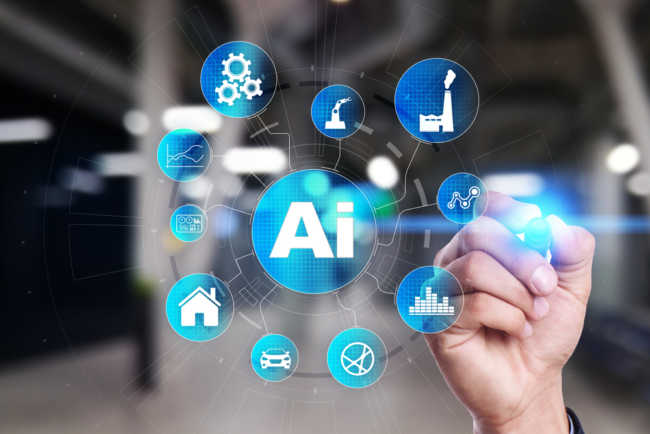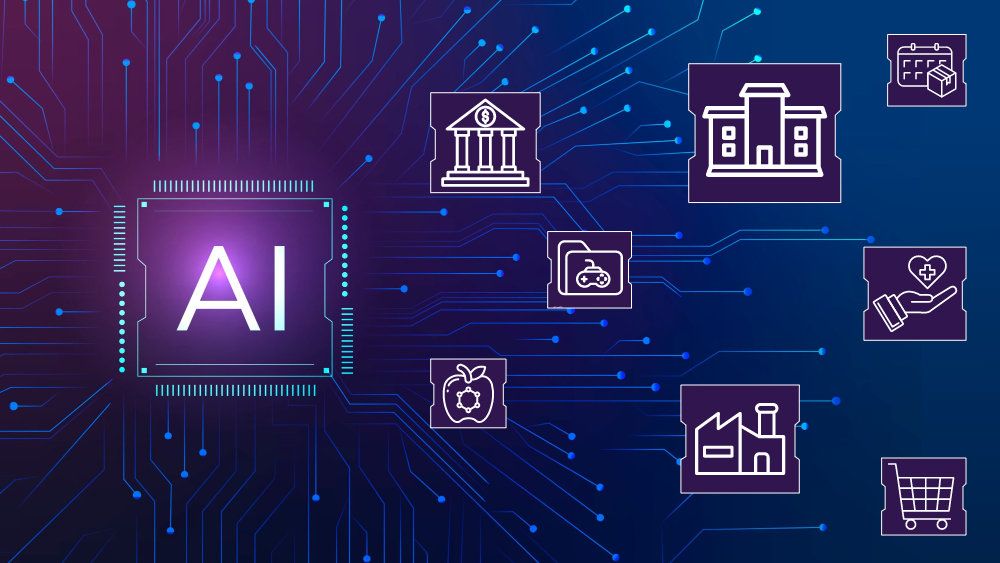Introduction: The Revolutionary Impact of AI Across Industries
AI in different industries has fundamentally transformed how businesses operate, innovate, and deliver value to customers. From healthcare diagnostics to financial trading algorithms, artificial intelligence continues reshaping traditional business models while creating unprecedented opportunities for growth and efficiency.
The global AI market, valued at $136.6 billion in 2022, is projected to reach $1.8 trillion by 2030, demonstrating the widespread adoption and benefits of AI in different sectors. This explosive growth reflects how organizations worldwide are leveraging AI technologies to solve complex challenges, enhance customer experiences, and gain competitive advantages.
Understanding how AI in different industries operates provides valuable insights for businesses considering digital transformation initiatives. Whether you’re exploring custom AI app development services USA or seeking AI integration services for mobile platforms, recognizing industry-specific applications helps inform strategic technology investments.
AI in Healthcare Industry: Revolutionizing Patient Care
Diagnostic and Treatment Enhancement
AI in healthcare industry applications have achieved remarkable breakthroughs in medical diagnosis and treatment planning. Machine learning algorithms now analyze medical imaging with accuracy rates exceeding 95%, helping radiologists detect cancers, fractures, and other conditions earlier than traditional methods.
Predictive analytics enable healthcare providers to identify patients at risk of developing chronic conditions, allowing for preventive interventions that improve outcomes while reducing costs. These systems analyze vast amounts of patient data, including electronic health records, lab results, and lifestyle factors.
Drug discovery and development processes have been accelerated through AI-powered molecular analysis and compound screening. Pharmaceutical companies report reducing drug development timelines from 10-15 years to 5-7 years, potentially saving billions in research and development costs.
Personalized Medicine and Patient Monitoring
Remote patient monitoring systems powered by AI continuously track vital signs, medication adherence, and symptom progression. These technologies enable early intervention and reduce hospital readmissions by up to 30%, significantly improving patient outcomes and healthcare system efficiency.
Personalized treatment protocols developed through AI analysis of genetic data, medical history, and treatment responses ensure patients receive optimal therapies tailored to their specific conditions and biological markers.
AI In Banking and Finance Industry: Transforming Financial Services
Risk Management and Fraud Detection
AI In Banking and Finance industry implementations have revolutionized security and risk assessment capabilities. Advanced machine learning models analyze transaction patterns in real-time, detecting fraudulent activities with 99.9% accuracy while minimizing false positives that inconvenience legitimate customers.
Credit scoring algorithms now incorporate alternative data sources beyond traditional credit histories, enabling financial institutions to serve previously underbanked populations while maintaining responsible lending practices. These systems process thousands of data points to make more accurate lending decisions.
Regulatory compliance automation helps financial institutions navigate complex regulatory environments by automatically monitoring transactions, identifying potential violations, and generating compliance reports. This reduces manual oversight costs while ensuring adherence to evolving regulations.
Artificial Intelligence In Option Trading
Artificial Intelligence In Option Trading has transformed investment strategies through sophisticated algorithmic trading systems that execute thousands of transactions per second. These systems analyze market trends, news sentiment, and economic indicators to identify optimal trading opportunities.
Portfolio management powered by AI algorithms continuously rebalances investment portfolios based on market conditions, risk tolerance, and investment objectives. These systems have demonstrated consistent outperformance compared to traditional investment approaches.
Robo-advisors democratize financial planning by providing personalized investment advice and automated portfolio management services at significantly lower costs than traditional financial advisors, making professional investment management accessible to broader populations.

Artificial Intelligence In the Retail Industry: Enhancing Customer Experiences
Personalization and Customer Engagement
Artificial Intelligence In the Retail Industry has revolutionized how businesses understand and serve customers. Recommendation engines analyze browsing behavior, purchase history, and demographic data to suggest products with up to 35% higher conversion rates than generic recommendations.
Dynamic pricing strategies powered by AI algorithms adjust product prices in real-time based on demand, competitor pricing, inventory levels, and customer behavior patterns. This optimization can increase revenue by 15-25% while maintaining competitive positioning.
Chatbots and virtual assistants handle customer inquiries 24/7, providing instant support for order tracking, product information, and basic troubleshooting. These systems resolve up to 80% of customer queries without human intervention, reducing support costs while improving customer satisfaction.
Inventory Management and Supply Chain Optimization
Demand forecasting algorithms analyze historical sales data, seasonal trends, and external factors to predict future product demand with 90% accuracy. This precision reduces inventory carrying costs while minimizing stockouts that result in lost sales.
Supply chain optimization systems coordinate complex logistics networks, optimizing delivery routes, warehouse operations, and supplier relationships to reduce costs and improve delivery times. These efficiencies can reduce supply chain costs by 15-20%.
AI in Logistics and Supply Chain: Streamlining Operations
Transportation and Route Optimization
AI in logistics and supply chain management has transformed transportation efficiency through intelligent route planning and load optimization. Advanced algorithms consider traffic patterns, weather conditions, delivery windows, and vehicle capacity to minimize fuel costs and delivery times.
Predictive maintenance systems monitor fleet vehicles and equipment, predicting maintenance needs before failures occur. This proactive approach reduces downtime by up to 50% while extending equipment lifespan and reducing maintenance costs.
Warehouse automation powered by AI coordinates robotic systems, optimizes picking routes, and manages inventory placement to maximize efficiency. These systems can increase warehouse productivity by 30-40% while reducing labor costs and human error.
Demand Planning and Inventory Optimization
Intelligent demand planning considers multiple variables including seasonal trends, promotional activities, economic indicators, and social media sentiment to forecast product demand accurately. This sophisticated analysis helps companies maintain optimal inventory levels while minimizing waste.
Real-time tracking and visibility systems provide end-to-end supply chain transparency, enabling proactive problem resolution and accurate delivery estimates. This visibility improves customer satisfaction while reducing operational disruptions.
Benefits of AI in Different Sectors: Quantifiable Value Creation
Operational Efficiency and Cost Reduction
The benefits of AI in different sectors extend far beyond automation, creating measurable value through improved decision-making, resource optimization, and process enhancement. Organizations implementing AI solutions report average cost reductions of 20-30% across various operational areas.
Process automation eliminates repetitive manual tasks, allowing employees to focus on higher-value activities that require creativity and strategic thinking. This shift often results in improved job satisfaction and productivity gains of 40-60%.
Data-driven insights enable organizations to identify inefficiencies, optimize resource allocation, and make informed strategic decisions based on comprehensive analysis rather than intuition alone.
Enhanced Customer Experience and Innovation
Personalized customer experiences delivered through AI technologies increase customer satisfaction scores by 15-20% while improving customer retention rates. These improvements directly translate to increased lifetime customer value and revenue growth.
Innovation acceleration occurs when AI tools assist in research and development, product design, and market analysis, enabling companies to bring new products and services to market faster than competitors.
AI Integration Services for Mobile Platforms: Enabling Digital Transformation
Mobile AI Implementation Strategies
AI integration services for mobile platforms have become essential for businesses seeking to deliver intelligent mobile experiences. These services encompass natural language processing, computer vision, predictive analytics, and machine learning model deployment optimized for mobile devices.
AI-powered mobile app development company partnerships enable businesses to integrate sophisticated AI capabilities without developing internal expertise. These partnerships accelerate time-to-market while ensuring implementation best practices and ongoing support.
Custom AI App Development Services USA
Custom AI app development services USA provide businesses with tailored solutions that address specific industry challenges and requirements. These services typically include consultation, solution design, development, testing, and deployment support.
AI-based mobile app development agency near me searches have increased by 300% over the past year, reflecting growing demand for local development partnerships that provide hands-on collaboration and responsive support.
Local development agencies offer advantages including time zone alignment, cultural understanding, and easier communication, which often result in more successful project outcomes and long-term partnerships.

Industry-Specific AI Implementation Considerations
Regulatory Compliance and Data Privacy
Different industries face varying regulatory requirements that impact AI implementation strategies. Healthcare organizations must comply with HIPAA regulations, while financial institutions navigate SEC and banking regulations. Understanding these requirements is crucial for successful AI deployment.
Data governance frameworks ensure AI systems handle sensitive information appropriately while maintaining transparency and accountability. These frameworks often require ongoing monitoring and auditing to ensure continued compliance.
ROI Measurement and Success Metrics
Return on investment calculations for AI implementations must consider both direct cost savings and indirect benefits such as improved customer satisfaction, reduced risk, and enhanced competitive positioning. Comprehensive ROI analysis typically shows positive returns within 12-18 months.
Key performance indicators for AI success vary by industry but commonly include accuracy improvements, cost reductions, time savings, customer satisfaction scores, and revenue growth metrics.
Future Trends and Emerging Applications
Evolving AI Technologies
Edge AI computing brings artificial intelligence processing closer to data sources, reducing latency and improving privacy while enabling real-time decision-making in resource-constrained environments.
Explainable AI addresses growing demands for transparency in AI decision-making, particularly in regulated industries where understanding algorithm reasoning is crucial for compliance and trust.
Federated learning enables AI model training across distributed datasets without centralizing sensitive data, addressing privacy concerns while enabling collaborative AI development.
Cross-Industry AI Convergence
Multi-industry AI platforms are emerging that leverage learnings from one sector to accelerate adoption in others. For example, computer vision techniques developed for manufacturing quality control are being adapted for medical imaging applications.
Industry collaboration on AI standards and best practices accelerates adoption while ensuring responsible AI development that benefits society as a whole.
Conclusion: Embracing AI Transformation Across Industries
AI in different industries represents more than technological advancement; it embodies a fundamental shift toward data-driven, intelligent business operations that deliver superior value to customers and stakeholders. From AI in healthcare industry applications saving lives through early diagnosis to AI in logistics and supply chain optimizing global commerce, artificial intelligence continues expanding its transformative impact.
The benefits of AI in different sectors are clear: improved efficiency, enhanced customer experiences, reduced costs, and accelerated innovation. Organizations that embrace AI technologies today position themselves for long-term success in increasingly competitive markets.
Whether you’re considering custom AI app development services USA or exploring AI integration services for mobile platforms, the key to success lies in understanding your specific industry requirements, selecting appropriate technologies, and partnering with experienced development teams.
Ready to transform your business with industry-specific AI solutions? Contact AI app developers and our expert team today to discuss how AI in different industries can address your unique challenges and unlock new opportunities for growth and innovation. Our comprehensive AI-powered mobile app development company services ensure successful implementation tailored to your industry requirements and business objectives.

































